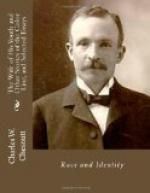Long, however, before the work of political reconstruction had begun, a brigade of Yankee schoolmasters and schoolma’ams had invaded Dixie, and one of the latter had opened a Freedman’s Bureau School in the town of Patesville, about four miles from Needham Green’s cabin on the neighboring sandhills.
It had been quite a surprise to Miss Chandler’s Boston friends when she had announced her intention of going South to teach the freedmen. Rich, accomplished, beautiful, and a social favorite, she was giving up the comforts and luxuries of Northern life to go among hostile strangers, where her associates would be mostly ignorant negroes. Perhaps she might meet occasionally an officer of some Federal garrison, or a traveler from the North; but to all intents and purposes her friends considered her as going into voluntary exile. But heroism was not rare in those days, and Martha Chandler was only one of the great multitude whose hearts went out toward an oppressed race, and who freely poured out their talents, their money, their lives,—whatever God had given them,—in the sublime and not unfruitful effort to transform three millions of slaves into intelligent freemen. Miss Chandler’s friends knew, too, that she had met a great sorrow, and more than suspected that out of it had grown her determination to go South.
When Cicely Green heard that a school for colored people had been opened at Patesville she combed her hair, put on her Sunday frock and such bits of finery as she possessed, and set out for town early the next Monday morning.
There were many who came to learn the new gospel of education, which was to be the cure for all the freedmen’s ills. The old and gray-haired, the full-grown man and woman, the toddling infant,—they came to acquire the new and wonderful learning that was to make them the equals of the white people. It was the teacher’s task, by no means an easy one, to select from this incongruous mass the most promising material, and to distribute among them the second-hand books and clothing that were sent, largely by her Boston friends, to aid her in her work; to find out what they knew, to classify them by their intelligence rather than by their knowledge, for they were all lamentably ignorant. Some among them were the children of parents who had been free before the war, and of these some few could read and one or two could write. One paragon, who could repeat the multiplication table, was immediately promoted to the position of pupil teacher.




